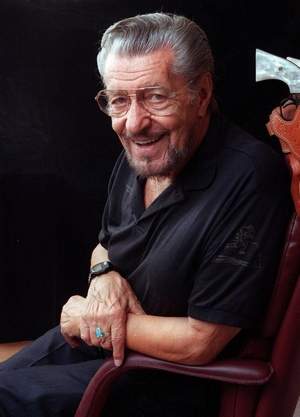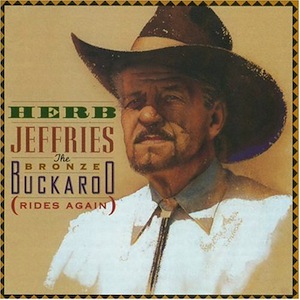

Herb Jeffries
“The Bronze Buckaroo” has died at age 100.
Herb Jeffries, who had that billing, was the first African-American singing-cowboy movie star. His films included Harlem on the Prairie (1937), Two-Gun Man From Harlem (1938), The Bronze Buckaroo (1939) and Harlem Rides the Range (1939).
His singing-cowboy theme song was his self-composed “I’m a Happy Cowboy.” In later years, he recorded for Warner Bros. Records in Nashville.
Born Umberto Alexander Valentino (or Balentino) in Detroit in 1913, he began his career in Chicago singing with the Erskine Tate orchestra. He rose to fame with the Earl Hines Orchestra by singing on national radio broadcasts in 1933.
“I was working in Hines’s band [in] 1935,” Jeffries recalled. “I was in Columbus, Ohio, working at a club there.” While on a cigarette break in the alley behind the club, he encountered a black child crying after being rejected by white playmates. Jeffries asked what was wrong. “They’re playing cowboy, and they won’t let me play,” said the little boy.
“When I was down South playing with Hines, I noticed there were thousands of discriminated theaters,” Jeffries continued. “Black theaters playing white cowboy pictures. I had done some research…and I said, ‘My goodness, why isn’t somebody playing black cowboy pictures?’”
Historians estimate that one in four working cowboys in the late 1800s was non-white. In the early days of rodeos, many champions were African Americans.
“Came out to California, and the deal was done,” said Jeffries.
Among Herb Jeffries’s cowboy songs are “Pay Day Blues,” “Git Along Mule,” “The Cowpoke’s Life Is the Only Life for Me,” “Almost Time for Roundup” and “Prairie Flower.” He did all his own western-movie stunts. During his movie-making days, he was sometimes billed as “Herb Jeffrey” or “Herbert Jeffries.”
 Following his stint as a singing cowboy, he joined Duke Ellington’s band in 1940. He sang the big 1941-pop hit “Flamingo” while in Ellington’s employ. His subsequent solo pop hits included 1947’s “When I Write My Song” and 1949’s “The Four Winds and the Seven Seas.”
Following his stint as a singing cowboy, he joined Duke Ellington’s band in 1940. He sang the big 1941-pop hit “Flamingo” while in Ellington’s employ. His subsequent solo pop hits included 1947’s “When I Write My Song” and 1949’s “The Four Winds and the Seven Seas.”
He moved to Paris in 1951 and opened his own nightclub. He joined the folk-revival movement by becoming a Calypso artist with the LP Jamaica. He starred with Angie Dickinson in the 1957 film Calypso Joe. He returned to pop with the highly regarded 1958 LP Say It Isn’t So.
One of his five wives was exotic dancer Tempest Storm, for whom he produced and directed a cult film in 1967. He returned to western roles when he portrayed a gunslinger on a 1968 episode of The Virginian. He also appeared on such 1960s and 1970s TV series as Hawaii Five-O, The Name of the Game and I Dream of Jeannie.
Herb Jeffries was “rediscovered” and brought to Nashville to record the 1995 CD The Bronze Buckaroo (Rides Again). Produced by Jim Ed Norman, the record included collaborations with Michael Martin Murphey, Take 6, Little Texas, Cleve Francis, The Sons of the San Joaquin and Rex Allen Jr. The album included the Jeffries tunes “I’m a Happy Cowboy,” “Lonesome Rider Blues,” “Down Home Cowboy” and “Pay Day Blues.”
Jeffries was 82 at the time. “I’m not old: I’m vintage,” he said. “I don’t use the world ‘old.’ I’m not searching for any kind of superstardom. I’d like to be remembered as a guy who walked among kings and never lost the common touch.”
Jeffries was inducted into the Western Music Hall of Fame in 1997. He has a 2004 star in the Hollywood Walk of Fame. Also in 2004, he was inducted into the Western Performers Hall of Fame at the National Cowboy & Western Heritage Museum in Oklahoma City.
Herb Jeffries died of heart failure on May 25 in West Hills, Calif. He is survived by wife Savannah, three daughters, two sons and several grandchildren and great-grandchildren.

About the Author
Robert K. Oermann is a longtime contributor to MusicRow. He is a respected music critic, author and historian.View Author Profile


